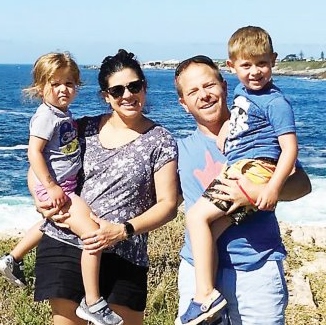
Featured Item

The ‘unsung heroes’ at camp
TALI FEINBERG
These professionals give up weeks of their December holidays to be on the campsites as medics, doctors, psychiatrists, psychologists, and secretaries. Most of these roles are voluntary, so why do they do it?
“My motivation is mainly my love for Habonim. I have a history there both as a channie and a maddie. I love the campsite, vibe, and memories, and I wanted to give back for what I got at Habonim,” says Dr Anthony Ger, an anaesthetist from Johannesburg. This is his second year as one of the main doctors at Habonim machaneh (camp), and he has helped out as a junior doctor in years past.
He says it’s also an amazing experience for his children, now aged six and four. “The open spaces, community spirit – it’s incredible. They run around at night with their torches and do activities with the youngest age group. They have their tags for the tuckshop, and really feel part of it. The freedom is fantastic. There is also a bit of a hidden agenda to prime them from an early age [to want to go to camp],” he quips.
“There are two doctors at a time on site, so we share the load. Most doctors go for about 10 days, so there can be about four or five doctors over the three weeks,” he says.
A typical day for a camp doctor at Habonim includes three shifts when the clinic is open, usually after meals. There is always someone on call for emergencies. Ger says he is working to change the “Strepsils mentality”, when kids think that no matter what’s wrong, the camp doctor will just give them a Strepsils (lozenge) and send them on their way. “Our channies deserve more. Thorough medical care makes for a happier campsite,” he says.
Avi Joseph will be attending his fifth camp as a medic at Bnei Akiva. “I attended seven camps as a channich. They were by far my best holidays. Attending camp as a medic is a way for me to thank an organisation which nurtured and shaped me during my youth,” he says.
A typical day involves all medics attending two daily clinics, one after breakfast and one after supper. The clinics generally run for about two hours, but it depends on the number of kids who need to be seen.
“Each medic has a number of days that they are on call, which means that they need to be on site and available for the channichim. There is an acute understanding that each channich requires attention, whether they are sick, have injured themselves in some way, or are just homesick. Each channich receives the appropriate attention and is validated,” he says.
“Days at camp can be long and demanding, so in order to stay fresh and focused, we do make sure that we get off the campsite when not on call to get some breathing space,” says Joseph. “We get to spend our holiday with other medics and doctors who are willing to sacrifice their holidays to give back and look after channichim. All these individuals are amazing people with one common goal. Overall it’s an experience I look forward to every year!”
Sharon Rosen will be at Habonim camp for the fourth time as therapist and social worker. “It’s the most fantastic thing, and really nice that my son and I both get to go. It’s a working holiday, and is such a great environment,” she says. “Camp runs phenomenally well, and seeing kids run it for kids – that’s incredibly meaningful. We are the ‘service provider’ adults helping our kids have those experiences.”
She says it’s also wonderful on a social level. There is great camaraderie among the support staff, and they have opportunities to go to Hermanus or to the beach. However, her priority is to support the channichim and madrichim.
“We work hard. Every day is different. I work on a casual, informal basis. Anyone can approach me anytime, and they have my phone number if I’m offsite. We deal with homesickness and other big issues like problems amongst a group of kids sharing a tent. Sometimes I will tell a child to come back for another session. I also offer a lot of support to the maddies. Sometimes they come to me in the middle of the night if there’s a child in crisis.”
Dr Caroline Serebro will be going to Habonim as a camp psychiatrist for the third time. She finds that often when there are issues at home, they “come to light” at camp, with children being in a new environment or because it is a “space” for kids to talk.
“I work closely with parents, but my main role is to deal with crises, not to offer ongoing therapy,” she says. The job can be difficult, like trying to decide if a child with mental-health issues should “stick it out” if camp is positive for them, or if they should rather be at home. Homesickness is a big issue, and is taken seriously.
It’s rewarding to volunteer as support staff, says Serebro. “The camaraderie is amazing, the ethos is admirable, and there are wonderful aspects to enjoy, making it a meaningful holiday experience. “It’s a privilege to be part of it.”




